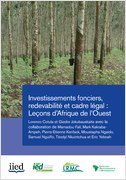Investissements fonciers redevabilité et cadre légal : leçons d’Afrique de l’ouest
Source: IIED
La récente vague de transactions foncières à grande échelle née des investissements agro-industriels a mis en lumière une demande généralisée en faveur d’une redevabilité accrue en matière de gouvernance des terres et des investissements. Les cadres légaux influencent les possibilités de reddition de comptes et le recours à la loi a figuré dans les réponses des communautés locales aux transactions foncières.



